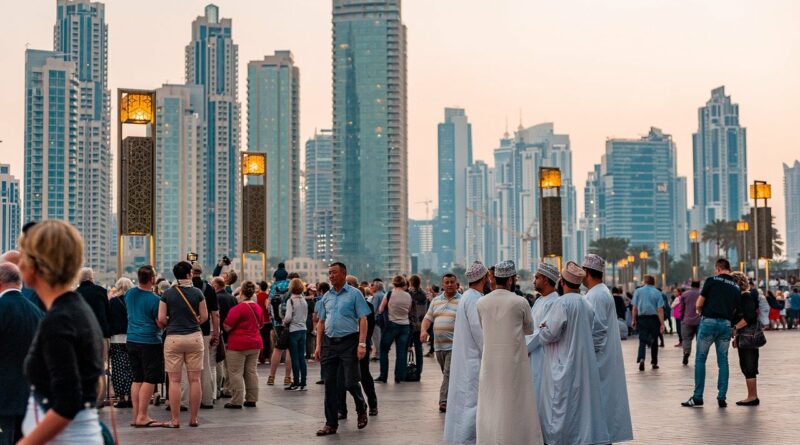What You Need to Know About People from Dubai
Dubai is one of the most fascinating cities in the world, known for its modern skyscrapers, luxury shopping, and vibrant cultural scene. As part of the United Arab Emirates (UAE), Dubai is a melting pot of diverse nationalities, with both local Emiratis and expatriates contributing to the city’s unique social fabric. If you plan to visit or do business in Dubai, understanding its people and their cultural values will help you navigate interactions smoothly. Here’s what you need to know about the people from Dubai.
1. Diverse Population
One of the most defining aspects of Dubai is its multiculturalism. While Emiratis are the native citizens of the UAE, they constitute only around 10-15% of Dubai’s population. The majority of the residents are expatriates from various countries, including India, Pakistan, the Philippines, the UK, and the US. This blend of cultures makes Dubai a truly global city where multiple languages, customs, and traditions coexist harmoniously.
2. Emirati Culture and Traditions
Emiratis are deeply rooted in their traditions and Islamic values. They are known for their hospitality, generosity, and strong sense of community. Traditional attire includes the kandura (a long white robe) for men and the abaya (a long black cloak) for women, often worn with a headscarf called a shayla. While Dubai is relatively liberal compared to other parts of the Middle East, Emiratis still uphold their cultural norms, and it is important to respect their customs, especially in public settings.
3. Languages Spoken
Arabic is the official language of Dubai, but English is widely spoken due to the city’s large expatriate population. Many People from Dubai also speak Hindi, Urdu, Tagalog, and other languages. If you are visiting or working in Dubai, knowing a few Arabic phrases like “Shukran” (thank you) or “Marhaba” (hello) can leave a positive impression.
4. Work Ethic and Business Culture
Dubai has a dynamic business environment, attracting professionals and entrepreneurs from all over the world. Emiratis and expatriates alike are known for their strong work ethic and ambition. Business meetings often start with small talk to establish rapport, and patience is key as decisions may take time. While Dubai embraces a modern corporate culture, showing respect for local traditions and hierarchy is essential for successful business dealings.
5. Religious and Social Norms
Islam plays a significant role in shaping Dubai’s societal norms. Although the city is open to people of all faiths, Islamic practices such as daily prayers, fasting during Ramadan, and modest dressing are respected. During Ramadan, eating, drinking, or smoking in public during daylight hours is prohibited out of respect for those fasting. Visitors and expatriates should also be mindful of public displays of affection and loud behavior, which are considered inappropriate.
6. Hospitality and Social Etiquette
People in Dubai are known for their warm hospitality. If you are invited to an Emirati home, it is customary to bring a small gift and accept Arabic coffee and dates when offered. Greeting customs vary; men usually shake hands, while interactions between men and women may involve a nod or verbal greeting rather than physical contact. Always address people with respect, using titles such as “Sheikh” or “Sheikha” for prominent figures.
7. Lifestyle and Entertainment
Dubai is famous for its luxurious lifestyle, offering everything from world-class shopping malls to high-end restaurants and entertainment venues. However, the city also has a thriving arts and culture scene, with museums, traditional souks, and heritage sites showcasing Emirati history. Many residents enjoy outdoor activities like desert safaris, water sports, and golf. Despite its modernity, Dubai remains deeply connected to its heritage, and festivals like the Dubai Shopping Festival and National Day celebrations highlight its rich cultural identity.
8. Food and Dining Culture
Dubai’s culinary scene reflects its diversity. Emirati cuisine, influenced by Arabic, Persian, and Indian flavors, features dishes like machbous (spiced rice with meat) and luqaimat (sweet dumplings). Due to the city’s multicultural population, international cuisine is widely available. While alcohol is served in licensed venues like hotels and private clubs, it is not permitted in public areas or for public consumption.
9. Dress Code and Public Behavior
Although Dubai is one of the most progressive cities in the Gulf region, modest dress is still recommended, especially in government buildings, mosques, and traditional areas. Swimwear is acceptable at beaches and pools, but revealing clothing in public places may be frowned upon. Respect for personal space and local customs is appreciated by both Emiratis and expatriates alike.
10. Sense of Community
Despite its cosmopolitan nature, Dubai has a strong sense of community. Emiratis value family ties and social gatherings, often spending time with extended relatives. Expats, too, form tight-knit communities based on nationality, profession, or shared interests. The city is safe, with a low crime rate, making it an attractive destination for families and professionals looking for a high-quality lifestyle.
Conclusion
People from Dubai embody a unique blend of tradition and modernity. While the city is a global hub filled with expatriates from all over the world. Emirati values remain at the heart of Dubai’s identity. Understanding and respecting local customs will enhance your experience in this dynamic and welcoming city. Whether you are visiting, working, or planning to move to Dubai, appreciating its people and their culture will help you build meaningful connections and navigate the city with ease.




